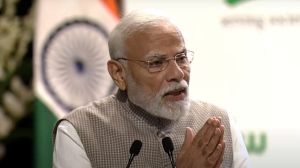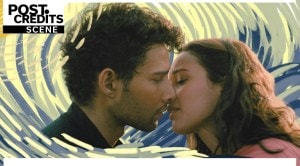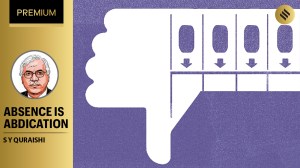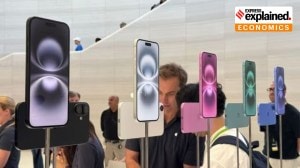Click here to follow Screen Digital on YouTube and stay updated with the latest from the world of cinema.
The Electric State movie review: The Russo Brothers deliver the worst film of their career; even The Gray Man wasn’t this grim
The Electric State movie review: Starring Chris Pratt and Millie Bobby Brown, the Russo brothers' new Netflix tent pole is the kind of movie that seems to get longer while you're watching it.
 Millie Bobby Brown and Chris Pratt in The Electric State.
Millie Bobby Brown and Chris Pratt in The Electric State. Someone on social media the other day posted that each of the last 15 Best Picture winners at the Oscars could’ve been funded for the amount that Netflix spent on The Electric State, the astronomically expensive new movie from directors Joe and Anthony Russo. We’re talking about films like Oppenheimer, which itself would’ve taken up $100 million of this cash pool, leaving the remaining $220 million to be spent on landmark films such as Parasite, 12 Years a Slave, and this year’s Anora.
Starring Chris Pratt and Millie Bobby Brown, The Electric State is the kind of movie that seems to get longer while you’re watching it. No matter how deep into it you are — it could be the end of the first act or the second — it always feels like there’s an hour still left. On the face of it, The Electric State isn’t a particularly long movie. It taps out at around 120 minutes, which is positively merciful of the Russos, whose first gig after the global success of the three-hour-long Avengers: Endgame was Cherry, a 141-minute drama about a drug addict who robs banks to fund his habit.
Also read – Damsel movie review: A dismal drag of a fantasy film from Millie Bobby Brown and Netflix
 A still from the Russo brothers’ new Netflix film, The Electric State.
A still from the Russo brothers’ new Netflix film, The Electric State.
Compared to The Electric State, Cherry seems like a work of startling originality. Heck, The Electric State falls short of even the low benchmark that the Russos set for themselves with their previous big-budget Netflix offering, the espionage thriller The Gray Man. Ayushmann Khurrana can complain all he wants about his career becoming collateral damage during the pandemic — as tastes changed, so did the audience’s interest in watching his films on the big screen — but it’s the Russos who’ve completely lost their mojo in the last five years.
Having developed a reputation for being spendthrifts — they’ve spent a grand total of nearly $1 billion on their last four projects, which also includes the disastrous Prime Video series Citadel — the Russos appear to be operating on autopilot. It’s content born out of a sense of contentment. Their post-pandemic projects have a certain algorithmic quality to them. The Russos’ primary objective isn’t to produce populist entertainment, but to build franchises. The Electric State has the same muddy aesthetic as each of their most recent projects — it’s a hodgepodge of hastily rendered CGI and half-baked lore.
The movie begins on a threatening note, with an elaborate (and clumsily executed) torrent of exposition. We flash back to an alternate mid-90s, where retro-futuristic robots programmed to do humanity’s bidding rose up in arms. A war ensued; the robots were eventually defeated and sent into exile in a cordoned-off corner of America. During the conflict, our heroine Michelle’s genius brother Christopher was kidnapped for having the special ability to mentally bond with machines (don’t ask). Some years later, Michelle is paid a visit by a Dobby-lite droid named Cosmo, who appears to have been possessed by the consciousness of Chris. Michelle resolves to go on an epic cross-country mission into the exclusion zone to reunite with her long-lost brother.
Along the way, she joins hands with a military veteran named Keats, played by Pratt. It’s yet another approximation of the Han Solo archetype that Pratt previously played in the Jurassic World films, as well as the Guardians of the Galaxy trilogy. Keats was a soldier during the war, but now works as some kind of smuggler along with his own robot companion, Herm, voiced by Anthony Mackie. You’d think that it would be beneath Captain America himself to voice a non-human comedy relief character in a film this poor, but that’s exactly what he does here. Spare a thought, however, for poor Colman Domingo, who ‘appears’ in a one-scene cameo as a security bot of some kind. He’s a two-time Academy Award nominee!
 The Electric State; Various Scavs stalk our heros in an abandoned amusement park in The Electric State.
The Electric State; Various Scavs stalk our heros in an abandoned amusement park in The Electric State.
Read more – Atlas movie review: Utterly irredeemable Jennifer Lopez action film marks a new low for Netflix tent-poles
But that’s the thing with the Russos these days; they bring everyone around them, including the audience, to their level. Alan Silvestri, who produced such memorable music for Avengers: Endgame, appears to have rehashed some of his themes from that film. And there’s no way of proving this, but certain shots in the Electric State’s action-packed climax seem to have been created by re-skinning similar shots from Endgame’s climactic battle. If Michael Bay can do this, there’s no way that the Russos can’t.
In The Electric State, they aim for a Spielbergian sense of wonder, but accomplish only one feat: eroding the magic of the movies, one frame at a time. There are, of course, attempts at humour. But because they’re made either by robots or human beings with a robotic personality, they fall flat. This is a disappointingly lifeless film, which is ironic, because one of its many unoriginal ideas is to question whether sentient robots have feelings. The Electric State also makes tired observations about post-9/11 paranoia, class inequality, and artificial intelligence. But while there’s plenty of artifice on display, you’ll have a hard time spotting any intelligence.
The Electric State
Directors – Joe Russo, Anthony Russo
Cast – Chris Pratt, Millie Bobby Brown, Woody Harrelson, Anthony Mackie, Stanley Tucci
Rating – 1/5


Photos
- 01
- 02
- 03
- 04
- 05
































